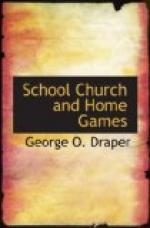An attention game. The pupils stand in the aisle beside their seats. In starting the game, the teacher asks them to face to the north, then to the south, then to the east, and to the west, so that they have the directions fixed in their minds. She then proceeds to tell a story or to make statements such as the following, “I came from the north.” At the mention of the word “north” all the pupils must turn and face towards the north. “But since I have arrived in the south,”—at the mention of the word “south” they all turn and face the south, etc. If the teacher should say “wind,” the pupils imitate the whistling of the wind; if “whirlwind” is mentioned, all must spin about on their heels a complete turn. Failing to do any of the required turns, the pupil takes his seat.
Geography
The pupils of each aisle constitute a team. Those in the front seats are Number 1, those next behind them, Number 2, and so on back. The teacher calls some number. The pupils having that number race to the board and write thereupon the name of some river, returning to their seats. The first one back wins one point for his team. The game continues until all the numbers have been called, the team having the most points wins.
Spelling Words
Have the pupils in aisle 1 face those in aisle 2, those in aisle 3 face 4, those in aisle 5 face 6. Appoint a captain for each aisle. The captain of one team starts spelling a word containing more than three letters. The captain of the team facing his, adds the second letter, not knowing what word the captain of the other team had in mind. The second man of the first team adds a third letter; the second man of the second team adds a fourth, each team trying to avoid completing the word. The team completing the word loses one point to the other team. For example, the first man of team A says “g,” the first man of team B says “o,” thinking of “gold.” The second man on team A says “o,” thinking of “goose.” The second man on team B can only think of “good” and contributes “d,” ending the word. Team A thereupon scores a point. The third man of team A continues the game by starting another word. When the ends of the aisles are reached the word, if uncompleted, is passed to the head of the line and continued.
If there are four aisles in the room, there will be two groups playing at the same time; six aisles, three groups; eight aisles, four groups. The captains of opposing teams keep a record of the score.
Rhymes
This game stimulates quick thinking. Some one is selected by the teacher to start the game, and thereupon gives some word to which the first pupil in the aisle must give a rhyming word before the former can count ten. Failing to do this, the leader continues and gives a word to the second one in the aisle. The rhyming words are to be given before the leader has completed his count of ten. Then the one succeeding in giving the word replaces the leader.




